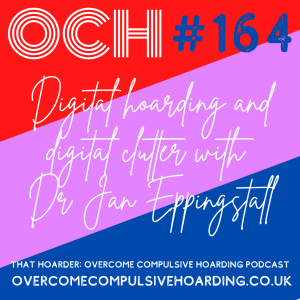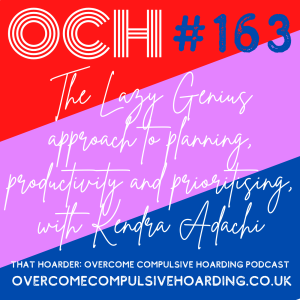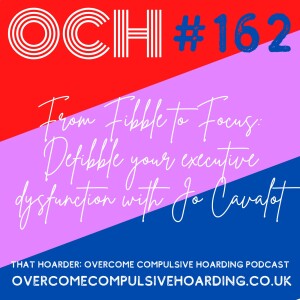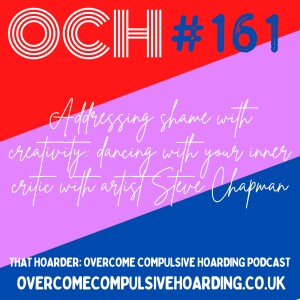That Hoarder: Overcome Compulsive Hoarding
Hoarding disorder is stigmatised and people who hoard feel vast amounts of shame. This podcast began life as an audio diary, an anonymous outlet for somebody with this weird condition. That Hoarder speaks about her experiences living with compulsive hoarding, she interviews therapists, academics, researchers, children of hoarders, professional organisers and influencers, and she shares insight and tips for others with the problem. Listened to by people who hoard as well as those who love them and those who work with them, Overcome Compulsive Hoarding with That Hoarder aims to shatter the stigma, share the truth and speak openly and honestly to improve lives.
Episodes

Friday Nov 08, 2024
Friday Nov 08, 2024
Come to a Dehoarding Accountability Zoom Session: http://www.overcomecompulsivehoarding.co.uk/ticket
Subscribe to the podcast: https://www.overcomecompulsivehoarding.co.uk/subscribe
Podcast show notes, links and transcript: http://www.overcomecompulsivehoarding.co.uk/
In this episode, I'm joined by Dr Jan Eppingstall, a counsellor with a PhD in hoarding, to discuss the phenomenon of digital hoarding, where people accumulate excessive digital items.
We'll explore the emotional responses to losing digital content, the organisational and environmental implications of digital clutter, and strategies for managing our ever-growing digital lives.
From the nostalgic pull of old photos to the overwhelming influx of emails, this conversation reveals the surprising similarities between physical and digital hoarding.
Introduction to Digital Hoarding
Definition of digital hoarding
Comparison with physical hoarding, highlighting similar stress, anxiety, and attachment.
Emotional Responses to Digital Loss
Non-hoarders experiencing emotions like anger and anxiety over losing digital items.
Technological Advancements and Digital Storage
The proliferation of digital content creation, especially digital photos.
Impact of technology on creating and storing digital content.
Historical context of storage limitations versus current capabilities.
Broader Implications of Digital Hoarding
Extending beyond photos and videos to emails, subscriptions, and digital accounts.
Cybersecurity risks and financial costs associated with digital hoarding.
Reasons we retain digital content.
Emotional Attachment and Digital Data
Emotional ties to digital items like photos and documents.
Reflecting identity and memory triggers in digital possessions.
Digital Organisation Strategies
Host's impeccably organised digital life contrasted with a cluttered home.
Tiago Forte's PARA method for prioritising digital items.
Inbox Zero and maintaining an organised email setup.
Challenges of Digital Clutter
Volume over efficiency: issues accessing necessary information despite organised files.
Parallels between digital and physical hoarding behaviours.
Digital Inefficiency and Environmental Impact
Wasted time, reduced focus, and productivity issues due to digital clutter.
Significant carbon footprint of data centres and environmental concerns.
Strategies for Managing Digital Clutter
Reducing digital intake by unsubscribing from unnecessary emails and content.
Advice on stopping excessive bookmarking and managing browser tabs.
Importance of setting up email filters to streamline email management.
Creating physical keepsakes from special digital photos for meaningful interaction.
Permission Slip Segment
Discussion on evaluating difficult-to-discard items for sentimental or practical reasons.

Friday Nov 01, 2024
Friday Nov 01, 2024
Come to a Dehoarding Accountability Zoom Session: http://www.overcomecompulsivehoarding.co.uk/ticket
Subscribe to the podcast: https://www.overcomecompulsivehoarding.co.uk/subscribe
Podcast show notes, links and transcript: http://www.overcomecompulsivehoarding.co.uk/
In today's episode of That Hoarder: Overcome Compulsive Hoarding podcast, I'm joined by Kendra Adachi, author of "The Plan, Manage Your Time Like a Lazy Genius," as we explore self-compassion and realistic productivity. We'll discuss cultural differences in self-trust, the pitfalls of traditional planning, and how small, manageable steps can lead to meaningful progress. Kendra's insights challenge societal expectations and underscore the importance of kindness and contentment in our daily lives.
Self-Trust and Societal Influences
Cultural differences in self-trust between men and women
Women's challenges with self-trust
Understanding systemic influences
Encouragement of kindness and acceptance towards oneself
Societal Expectations and Productivity Pressure
Critique of the "hustle" culture and pressure for excellence
Contentment as opposed to constant optimisation
Kindness to oneself as an alternative to relentless improvement
Resistance to the idea of contentment
Contentment and Self-Compassion
Contentment not the same as giving up
Defining contentment as awareness and appreciation of the present
Self-compassion as a holistic life perspective
Contentment and making mistakes
Hoarding and Mindset Shifts
Problem with future-focused thinking
Importance of prioritising what matters to us
Shifting mindset towards valuing fewer things and creating space
Kinder approach to oneself and questioning what we have lose by trying contentment
Integration vs. Greatness
Embracing integration over achieving greatness
Honouring emotions and practicing self-kindness
Goal setting challenges and adopting flexible approaches
Shrinking priorities to manage overwhelm
Planning and Productivity Challenges
Discussion on why many struggle with planning and productivity
Unrealistic expectations from productivity experts
Internalisation of failure for unmet expectations
Disparity in authorship vs. readership of time management books
The Lazy Genius Way and Practical Strategies
Introduction to concepts from "The Lazy Genius Way"
Principles of "going in the right order" (naming what matters, calming the chaos, trusting oneself)
Encouragement of smaller, manageable steps
Potential for meaningful change despite societal pressures

Friday Oct 25, 2024
Friday Oct 25, 2024
Come to a Dehoarding Accountability Zoom Session: http://www.overcomecompulsivehoarding.co.uk/ticket
Subscribe to the podcast: https://www.overcomecompulsivehoarding.co.uk/subscribe
Podcast show notes, links and transcript: http://www.overcomecompulsivehoarding.co.uk/
In today's episode, I chat with Jo Cavalot, a compassionate inquiry practitioner and coach, about tackling executive dysfunction through a unique concept called "fibble", designed to help those struggling with focus and organisation. Jo shares her insights into treating internal parts with kindness, her own journey of recovery, and how she co-created Fibble as a tool to understand and manage executive function challenges. We explore the importance of personalised support in overcoming obstacles, and Jo offers a special discount for listeners interested in her work.
Importance of a compassionate approach
Internal family systems and parts work.
Viewing internal parts as friends with individual needs.
Differentiating exploratory sessions from physical organisation tasks.
Executive Dysfunction and 'Fibble' Concept
Challenges of executive dysfunction, specifically among people who hoard.
Use of the 'fibble' acronym: Frustrated, Inadequate, Baffled, Befuddled, Lacking, and Exhausted.
Fibble as a practical tool
Jo Cavalot's experience with alcoholism
Parallel between Jo's alcohol experience and hoarding.
Emotional challenges and non-linear nature of recovery.
Emphasis on self-awareness and self-compassion.
Jo's significant life changes, like moving to Spain and involvement in the Camino de Santiago.
Motivation through personal recovery and organisational skills.
Involvement and motivation in Hoarding Disorders UK.
Compassionate Inquiry, Based on Dr. Gabor Mate's work, focusing on trauma's impact.
Positive impacts on clients with hoarding behaviours and related trauma.
Key Challenges and Strengths in Addressing Organisation
Common challenges: sustained attention, organisation, self-activation, planning, and prioritising.
Creative problem-solving as a strength.
Flexible thinking and stress tolerance.
Use of a questionnaire assessing executive functioning across environments.
Understanding and leveraging diverse personal strengths.
Varying self-activation for personal vs. others' tasks.
Goal Setting and Personalisation
Personalised tools over generic advice.
Introduction of the Ikigai concept in goal setting.
Use of the fibble questionnaire for personal assessment and support.
Understanding and Addressing Underlying Causes
Identifying trauma responses and underlying causes.
Adjusting expectations based on life circumstances.
Holistic and trauma-informed support for personal challenges.

Friday Oct 18, 2024
Friday Oct 18, 2024
Come to a Dehoarding Accountability Zoom Session: http://www.overcomecompulsivehoarding.co.uk/ticket
Subscribe to the podcast: https://www.overcomecompulsivehoarding.co.uk/subscribe
Podcast show notes, links and transcript: http://www.overcomecompulsivehoarding.co.uk/
In this episode, I’m joined by Steve Chapman, an artist and coach, to talk about working creatively with your inner critic. We talk about understanding this inner voice as a misguided protector rather than an enemy and explore creative approaches like drawing or dancing with your critic to better engage with it. However sceptical you may be about it, listen to us talk about finding compassion for that voice in your head and how art can be a therapeutic ally in your journey. Even if, like me, you cannot draw!
Steve Chapman: artist, writer, speaker, coach, with a background in Gestalt psychology, improv theatre, coaching, and art therapy.
Discussion on creativity, imperfection, being stuck, shame, and the inner critic.
Struggles with a harsh inner critic for years.
Perspective shift influenced by the song "Hi Ren"
Insights on the Inner Critic
Inner critics act as misguided protectors from early childhood.
An approach to understand inner critics rather than fight them.
Creative Approach to the Inner Critic
Drawing or creative engagement to externalise and personify the inner critic.
Small creative experiments to better understand the inner critic.
The therapeutic nature of experimenting with art.
Inner Critic & Self-Compassion
Developing a compassionate relationship with the inner critic.
Thich Nhat Hanh on nurturing inner energy.
Dealing with worry through acceptance and self-compassion.
Art as a method to engage with emotions and inner critic
Resonates with others and serves as a therapeutic tool.
Shame & Vulnerability
Shame thrives in secrecy; exposing it diminishes its power.
Importance of bringing shame to light as discussed by Brene Brown.
Comfort and Discomfort
Finding a balance between comfort and distress.
Advocates for taking small steps toward addressing discomfort.
Discussing mental health openly demonstrates personal growth and reduced stigma.
Working with different materials for creative exploration.
Workshops begin without set goals to allow creativity to flourish.
Dealing with Inner Critics
Awareness of inner critics as part of being human and lifelong process.
Engaging with the inner critic in a playful rather than adversarial way.
Therapeutic Work and Community Support
Value of in-depth therapeutic work and community support in managing inner critique.
Artistic Abilities and Perceptions
Societal pressures influence perception of artistic ability.
Chapman aims to inspire and counter feelings of inadequacy.
Role of Continuous Exploration in Art
Art viewed as an ongoing process rather than a definitive product.
Tuning into emotions and body sensations beyond verbal communication.

Friday Oct 11, 2024
Friday Oct 11, 2024
Come to a Dehoarding Accountability Zoom Session: http://www.overcomecompulsivehoarding.co.uk/ticket
Subscribe to the podcast: https://www.overcomecompulsivehoarding.co.uk/subscribe
Podcast show notes, links and transcript: http://www.overcomecompulsivehoarding.co.uk/
In this episode, I explore how the change of seasons can inspire and motivate dehoarding efforts, with autumn in the northern hemisphere and spring in the southern hemisphere being upon us. Drawing on traditions like harvest festivals and spring cleaning, we'll discuss how nature’s rhythms can support our journey toward a more organised home. Plus, personal insights on managing the emotional challenges of letting go and tips for embracing seasonal transitions as opportunities for growth.
Seasonal Influence on Dehoarding
Autumn Motivation
Mixed feelings: beauty vs. precursor to winter
Harvest festivals: gratitude and inspiration for giving and decluttering
Nesting instincts as a motivational tool for organizing
Spring Motivation
Symbolism of renewal and hope
Growth and change as motivators for overcoming hoarding disorder
Spring cleaning tradition as an opportunity for new beginnings
Emotional Aspects of Decluttering
Acknowledge and understand feelings like overwhelm, anxiety, confusion, and fear
Use emotions to gain self-insight and understand attachment to items
Seek support from therapists, friends, family, or professional organisers
Practical Steps for Dehoarding
Assess possessions when transitioning between seasons
Evaluate practical use of items like blankets and coats
Decluttering inspired by seasonal changes
Focus on small areas to avoid overwhelm
Small, consistent changes over dramatic ones
Set realistic goals for home improvements by New Year
Community and Support
Engage in dehoarding accountability sessions for communal support
Donating items to reduce unnecessary storage
Assess what you want for your home as the year end approaches
Aiming for improvement, maintenance, or worsened state?
Set intentions
Walking, observing nature, and journaling
Creating Rituals and Redefining Comfort
Suggest creating rituals in tune with seasonal changes to aid decluttering
Redefine comfort by reducing clutter rather than accumulating more
Highlight the importance of a comfortable, decluttered space for winter

Friday Oct 04, 2024
Friday Oct 04, 2024
Come to a Dehoarding Accountability Zoom Session: http://www.overcomecompulsivehoarding.co.uk/ticket
Subscribe to the podcast: https://www.overcomecompulsivehoarding.co.uk/subscribe
Podcast show notes, links and transcript: http://www.overcomecompulsivehoarding.co.uk/
On this episode, I share my experience from being a guest on Death, Sex & Money with Anna Sale. Then I dig into the idea of wanting things but still choosing not to have them and how it applies to various aspects of life, especially for those of us dealing with hoarding disorder. I’ll discuss how the disorder can distort our perception of items, leading to irrational attachments. I look at how desires often change over time, the unhealthy attachments formed for identity, comfort, or security, and how fear of regret can hinder the decluttering process.
Choosing Not to Have Desired Items
Distortion of item perception in hoarding disorder
Temporary nature of desires
Safety and clutter concerns
Emotional and Irrational Attachments
Understanding and challenging emotional attachments
Exploring reasons for keeping or acquiring items
Addressing “irrational” beliefs
Dealing with fear of regret
Joy from finding things often surpasses regret (Jasmine Sleigh's insight)
Managing regret is possible
Decision-making with clutter in mind
Not Retaining Items for Others
It's not our responsibility to keep items for others
Prioritising personal and familial well-being
Setting boundaries regarding others' potential desires
Feeling loss, fear, sadness, and nostalgia
Acknowledgment and validation of these feelings
Communicating fears and emotions
Recognising and challenging irrational thoughts and feelings
Celebrating small victories without adding more clutter
Liberation and freedom from letting go
Misinterpreting laziness as anxiety
Anxious sloth and decreased productivity

Friday Sep 27, 2024
Friday Sep 27, 2024
Come to a Dehoarding Accountability Zoom Session: http://www.overcomecompulsivehoarding.co.uk/ticket
Subscribe to the podcast: https://www.overcomecompulsivehoarding.co.uk/subscribe
Podcast show notes, links and transcript: http://www.overcomecompulsivehoarding.co.uk/
In today’s episode, I’m chatting with Dr. Jan Eppingstall, a Melbourne-based counsellor, about what it means to take a trauma-informed approach to hoarding disorder. Stick around as we break down why understanding trauma is crucial for effective support and treatment.
Trauma-informed approaches to understanding and treating hoarding
Importance of understanding trauma's impact
Concerns about wellbeing inquiries without adequate support preparation
Collaboration in Trauma-Informed Care
Practical Implementation for Non-Therapy Roles**
Incorporate trauma-informed principles
Sensitivity to potential triggers
Misconceptions and Communication
Fear factor surrounding trauma and its treatment
Detailed trauma disclosure unnecessary for effective support
Client Autonomy and Professional Boundaries
Respecting clients' communication preferences
Retraumatisation in Hoarding
Harm of forced clearances and strangers touching possessions
Negative impact of language and actions on hoarders
Respectful Support Practices
Building Trust
Importance of building trust before intervening in a hoarder's space
Ensuring professionals genuinely practice trauma-informed care
Over-explaining as a stress response
Broad approach of trauma-informed care
Factors influencing trauma perception
Trauma Definition
Trauma and Hoarding
Commonality of trauma in hoarding histories
A supportive framework rather than a treatment model
Five Pillars of Trauma-Informed Care
Assuming trauma backgrounds in hoarding behaviour clients
Loss of Control in Trauma
Trauma involves loss of control; care pillars help restore it
Tracking and managing nervous system responses
Importance of recognising client-specific signs
Term misuse by minimally trauma-informed trained professionals
Dangers of Misleading Trauma Informed Claims
Proper understanding of trauma to avoid harm
Non-therapists adopting trauma-informed principles
Importance of feeling present and calm during therapy
Teaching clients to feel safe and grounded
Clear Boundaries in Therapy
Trauma Types and Responses**
Variability of trauma
Explanation of retraumatisation
Managing Retraumatisation

Friday Sep 20, 2024
Friday Sep 20, 2024
Come to a Dehoarding Accountability Zoom Session: http://www.overcomecompulsivehoarding.co.uk/ticket
Subscribe to the podcast: https://www.overcomecompulsivehoarding.co.uk/subscribe
Podcast show notes, links and transcript: http://www.overcomecompulsivehoarding.co.uk/
In this episode, I look at two major – and opposing – strategies for dehoarding: "swallow the frog," where you handle the toughest task first, and "save the worst till last," which focuses on building confidence with easier tasks. I'll discuss the benefits and drawbacks of each approach and offer tips for blending them to fit your unique needs. Join to learn how to break down the overwhelming task of dehoarding into manageable steps.
Swallowing the Frog
Best when preventing access to essential areas (e.g., cooker, bath).
Tackling tough tasks first can improve home functionality and reduce stress.
Saving the Worst Till the Last
Building confidence in dehoarding.
Tasks that are emotionally charged but less visibly impactful (e.g., old photos).
Utilising both approaches based on emotional resilience and situational needs.
Experimentation with both strategies.
Reflect on personality and typical approaches to difficult tasks.
Planning strategies based on task suitability and personal motivation.
Curiosity and trying different methods.
Observing outcomes and refining methods.
Balancing approaches for optimal dehoarding progress.
Embracing flexible planning and adjusting as needed.
Breaking Down Tasks
Breaking tasks into smaller, manageable steps.
Working for shorter, focused periods with breaks to prevent burnout.
Building Confidence
Addressing easier tasks first to build capability for more challenging tasks.
Sorting manageable items before tackling emotionally difficult possessions.
Mixing both "Swallow the Frog" and "Save the Worst Till Last" strategies.
Examination of the psychological impact of task management.
Discussing mental barriers, procrastination, and overwhelm.
Emphasis on efficiency and making progress to avoid demoralisation.
Strategies to manage overwhelming dehoarding tasks
Identifying the "frog."
Two opposite strategies for handling hard tasks.
Resolve tasks early to minimise stress and discomfort.
Breaking tasks into smaller chunks mitigates overwhelming discouragement.
Starting with easier tasks provides steady motivation.
Procrastination perpetuates stress from avoiding major tasks.
Ease into dehoarding with manageable tasks first.
Try both approaches, observe, adapt, and refine.
Examining two strategies for tackling hard tasks in the context of dehoarding: "swallow the frog" (address tough tasks first) vs. saving the worst for last, focusing on their psychological impact on barriers, procrastination, and efficiency.
Completing tasks alleviates stress and builds momentum for future tasks.
Swallowing the frog can be discouraging if tasks are tougher than expected. Break tasks into smaller chunks to avoid demoralisation. Identify and prioritise your most challenging tasks, such as urgent issues or emotionally taxing items.
Starting with smaller tasks provides steady motivation and achievement, offering quick wins that boost morale and maintain long-term productivity.
Procrastination on the most urgent task causes continuous stress and anxiety, overshadowing achievement of smaller tasks.
Start with moderately hard tasks, gradually advancing to harder tasks over time. Adapt approaches based on task suitability.
Start with easier tasks to build confidence when dehoarding, and save emotionally challenging items for later. Use both approaches as needed based on your situation.
Try both approaches and observe which helps you make the most progress. Keep adapting and refining based on your observations.

Friday Sep 13, 2024
Friday Sep 13, 2024
Come to a Dehoarding Accountability Zoom Session: http://www.overcomecompulsivehoarding.co.uk/ticket
Subscribe to the podcast: https://www.overcomecompulsivehoarding.co.uk/subscribe
Podcast show notes, links and transcript: https://www.overcomecompulsivehoarding.co.uk/podcast-ep-156-identifying-the-shopping-triggers-that-create-our-urge-to-impulse-buy/
In today's episode, I’ll help you identify the triggers that make us want to acquire stuff and how to use that knowledge to combat the urges to buy impulsively. We’ll explore practical strategies like observing urges, delaying reactions, and using distractions to curb impulsive buying. Plus, we’ll uncover the deeper emotional and environmental triggers that drive compulsive shopping and how to address them.
Emotional Triggers
Identifying emotional triggers like stress, sadness, boredom, and anxiety.
Understanding the role of dopamine in shopping behaviours.
Recognising the temporary distraction of shopping from negative emotions.
Environmental Triggers
Discussing how shopping environments stimulate purchases through strategic design.
Marketing tactics designed to exploit spending prompts.
Ecommerce Optimisation
Strategies ecommerce websites use to maximise purchases.
Seamless and tempting buying experiences.
Ease of Access
The convenience and immediacy of online shopping.
Encouraging impulsive purchases through immediate gratification.
Social Triggers
The influence of peer pressure, FOMO, and social validation.
Buying to fit in or earn social approval.
Self-Reflection and Values
Evaluating whether purchases align with personal values.
Seeking meaningful praise beyond materialistic validation.
Journaling as a Tool
Identifying and understanding personal triggers through journaling.
Noting emotions, activities, and feelings before and after purchases.
Pattern Identification
Analysing journal entries to identify shopping patterns and triggers.
Behaviour Change and Avoidance
Adjusting behaviour to avoid known triggers.
Implementing stress management techniques to handle stress-induced shopping.
Mindfulness for Identifying Triggers
Encouraging presence and consciousness in the moment.
Observing sensations, thoughts, and feelings without judgment.
Enhancing self-awareness for deliberate actions.
Observing Urges
Acknowledgment of the urge to buy and sitting with it.
Comparing urges to waves – they rise and fall.
Practicing distress tolerance during unpleasant urges.
Delayed Reaction Technique
Delaying purchase decisions to avoid impulsive buys.
Starting with short delays (e.g. 1 minute) and extending them.
Developing longer periods without giving in to urges over time.
Distraction as a Tool
Engaging in alternative activities.
Contacting friends and talking through the urge.
Reducing immediate impulses through distraction.
Addressing the Root Causes
Focusing on underlying issues (anxiety, depression, boredom).
Pursuing therapy, self-help resources, lifestyle changes, or medical treatment.
Avoiding Triggers
Avoiding people or environments that encourage unnecessary shopping.
Finding alternatives to shopping activities.
Shopping in places that minimise impulse-buying triggers.
Complexity and Difficulty
Acknowledging the multifaceted nature of combating buying urges.
Recognising triggers and managing urges requires effort and practice.
Host’s personal experiences with guilt and shame from compulsive buying.
Discussing the financial strain and relationship stress caused by impulsive purchases.
Emphasising the mental and emotional health impacts.
Impulsive shopping causes financial and relationship stress.
Emotional triggers can lead to impulsive shopping.
Awareness of emotions can reduce impulsive shopping.
External triggers and dopamine drive impulsive buying.
Question purchases' true value.
Praise for values is deeper than material praise.
Mindfulness helps identify triggers by observing sensations.
Address anxiety holistically, considering therapy and lifestyle.
Avoid triggers to reduce compulsive buying impulses.
September's update for Dehoarding Darlings includes extras and a Q&A with Jan. Sign up at overcomecompulsivehoarding.co.uk/darling.
Bi-monthly dehoarding Zoom sessions: Sunday evenings (UK), Friday mornings (UK).
Impulsive shopping causes financial and relationship stress, guilt, and clutter. Today's episode explores triggers to address and mitigate these issues.
Emotional triggers like stress, boredom, sadness, and anxiety can lead to impulse shopping as a temporary escape, though this often results in further stress due to added clutter and financial strain.
Awareness of evening fatigue helped me stop shopping out of boredom or anxiety. Recognising emotional triggers can prevent impulsive purchases.
Marketing and environmental triggers compel people to buy impulsively for dopamine hits, involving extensive research.
It feels great to get social validation from buying items, but it's worth questioning if possessions define our identity and relationships.
Identify triggers for impulsive buying through self-reflection and journaling to align purchases with personal values.
Mindfulness helps identify triggers by being present, aware of feelings, sensations, and thoughts, leading to greater self-awareness and deliberate actions.
Address anxiety and depression through therapy, lifestyle changes, and avoiding triggers, rather than impulsive shopping.
Avoid environments that trigger unnecessary shopping to break the habit. Find alternatives like meeting friends in different places or shopping online.

Friday Sep 06, 2024
Friday Sep 06, 2024
Come to a Dehoarding Accountability Zoom Session: http://www.overcomecompulsivehoarding.co.uk/ticket
Subscribe to the podcast: https://www.overcomecompulsivehoarding.co.uk/subscribe
Podcast show notes, links and transcript: http://www.overcomecompulsivehoarding.co.uk/
In this episode, Dr. Jan Eppingstall and I are exploring the impact of self-stigma and societal responsibility in hoarding. We look in depth at stigma and how it affects individuals with mental health conditions, especially hoarding disorder, and how self-stigma can damage us and prevent us from seeking help. Plus, we introduce a new segment — "permission slip". Stay tuned for some outtakes at the end!
Impact of Public Stigma and Self-Stigma
Dr. Jan Eppingstall explains public stigma, including stereotypes, prejudice, and discrimination
Key facets of public stigma: difference, disdain, and blame
Understanding Self-Stigma and Public Stigma
How stereotypes can affect self-stigma, using people's reactions to TV shows as an example
The implications of self-stigma, including low self-esteem, hopelessness, and reluctance to seek treatment
The interlinking of public stigma, self-stigma, shame, and self-consciousness, as well as self-blame and the impact of self-stigma on seeking help
Variation in mental illness stereotypes by disorder
Introduction of the "permission slip" segment
Discussion on the compulsion to keep things and the completionist mindset
Influence of Socioeconomic Status on Mental Illness Stigma
Conversation about the perception of hoarding based on socioeconomic status and the value of items being kept
Comparison of hoarding in different contexts: ample space and financial means versus living in a cramped environment
Impact of space and wealth on hoarding, highlighted through a documentary about Celine Dion and her extensive costume collection
Acceptance and Commitment Therapy (ACT) in Addressing Self-Stigma
Dr. Eppingstall outlines the ACT approach, focusing on personal values and psychoeducation on relational frame theory to address self-stigma
Cognitive behavioural therapy techniques like reframing and peer support groups to combat self-stigma, as well as radical acceptance through a 10-step process
Influence of Cultural Beliefs and Social Factors on Stigma
Discussion of the influence of cultural beliefs on mental illness stigma, including the impact of social factors on self-stigmatisation
Protective factors against self-stigmatisation: quality of life, social relationships, and cultural acceptance of mental illness
The impact of societal influences on self-stigma and the importance of understanding one's thought patterns without trying to banish them
External stigma's potential influence on self-stigma, with a suggestion that marginalised individuals facing more external stigma might be more susceptible to self-stigmatisation
Internalised social stigma leads to negative self-concept.
Self-stigma affects help-seeking behaviours negatively.
Questioning stigmatisation and hoarding in media.
Cultural stigma influences self-stigmatisation of mental illness.
Communities’ response to mental illness.
Self-stigma's impact varies based on individual factors.
Internalised stigma is the acceptance of negative societal stereotypes.
Self-stigma creates harm, deters seeking help.
Reflection on hoarding stigma and societal perceptions.
Public stigma in different cultures affects self-stigmatisation and attitudes toward mental illness and treatment.
Reflecting on community's approach to mental illness and its impact on self-stigma.
Practicing radical acceptance, using self-acceptance talk and behaviour changes to move forward.
Self-stigma affects people differently based on various factors such as personality, upbringing, and society. Different societies can influence how people perceive and react to self-stigma.









